| |||||||||||||||||||||||||||||||||
| Facts > Pagan Ideas > Phony Quotes | ||||
| Making up "quotations" |
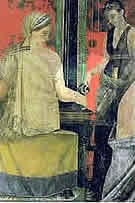 |
Speeches
[in] ancient historical writing... Away back yonder in bible times, writers got their "quotations" by making them up. Pagan authors did this. So did Jewish writers. So did the folks who wrote our gospels. Christianity is a product of its time and place. Our gospels are literary products. |
 |
||
|
How'd he know that?
Let me show you what I mean. As we pick up our story, Matthew is setting up the birth of Jesus... |
|
Matthew quotes the wise men verbatim. >> Now, we don't really know who "Matthew" was, or when he wrote, but even the most arch credulous Christian apologists admit Matthew 2:1 was written multiple decades after the events described, "Matthew" wasn't there when these words were spoken, and "Matthew" never met the magois who supposedly spoke these words. |
Gospel
of Matthew, Chapter 2 |
And anyway, what "Matthew" describes —all the magois standing there saying these same words all together— cannot have really happened. Real people don't do that. What "Matthew" says happened did not really happen. Not literally. Not actually. |
| Next, "Matthew" tells us the private thoughts of King Herod. How does "Matthew" know what Herod thought? >> All Jerusalem was troubled? All? Really? How could "Matthew," writing decades later know that all Jerusalem was troubled? He couldn't. >> |
|
|
| Next, by our standards, "Matthew" puts a group of people together, all saying the same words at the same time. "Matthew" quotes this chorus exactly. >> This is not possible. Real people don't act this way, and if they did their exact words could not be accessible to themselves decades later, let alone to someone they didn't know, who wasn't there. |
|
|
What "Matthew" clearly and explicitly claims to have happened cannot possibly have happened. |
|
Then "Matthew" describes the doings of Herod's
secret meeting, |
|
|
|
New Testament, Gospel of Matthew (second century AD?), -- which you can read at Perseus.. |
|
"Matthew" claims to know stuff he could not
possibly have known. "Matthew" says things
happened that could not possibly have happened. "Matthew"
made stuff up. The Gospel of Matthew, right there in
our Bible, So was "Matthew" a dirty liar? No, he wasn't.
"Matthew" was a product of his time and
place. In ancient times this is how people wrote
history. In ancient times historians routinely, unashamedly,
got their quotations by making them up. |
. Away back in bible times, nobody reading this would have thought the magoi men literally stood together and actually spoke exactly these words. People reading "Matthew" back then understood that "Matthew's" "quotation" was an invention that captured what the magois thought about their mission.
Or, more precisely, what "Matthew" thought the magois thought about their mission. That's a distinction worth understanding. Because "Matthew" is not mechanically repeating words that were literally, actually spoken, what we're getting is not what actually happened. What we're getting is stuff "Matthew" made up. In our gospel, "Matthew" made stuff up.
|
|
Here at POCM you and I will look at all the sayings and speeches "quoted" in the gospels (not every one--all; but Jesus', and Herod's, and angels', and dream ones, and unspoken thought ones--all). We'll also look at how ancient writers in general used quotes. What we'll discover is: ancient writers made up quotes. They just made them up. So did the New Testament gospelers. Made up quotes is another element of Christianity borrowed from Paganism. |
|
|
As we'll see, Plato, Herodotus, Livy, Diodorus, Philostratus and all
those other ancient fellows knew the words they "quoted"
were The ancients didn't have cameras either. But that doesn't mean every ancient sculpture and every surviving ancient mosaic is a lie. Because the ancients didn't have the technology for verbatim quotation, everybody understood that "quotations" were there for dramatic effect, or to move the plot along, or for some reason other than verbatim recording. The idea that a written quotation should be an exact record of the words spoken, that's a modern notion. The problem is not them, the problem is us. |
Examples
of how ancient writers used "quotations" Here are a few drops from the ancient ocean... |
* (from our modern quotes-are-verbatim-records point of view) |
|
Plato Like lot's of folks back then, Plato (in the fourth century BC) wrote up his philosophical ideas in dialogues in which people talk back and forth to each other like characters in a play. Socrates says this, Timaeus says that, and so on and so on. >> No one thought Plato's dialogues were exact accounts of the words people actually said one day. Everyone understood Plato's "quotations" -- many of which ran to thousands of words -- were a literary device. That's how the ancients did it. The ancients made up quotes.
|
Socrates. One, two, three; but where, my dear Timaeus, is the fourth of those who were yesterday my guests and are to be my entertainers to-day? Timaeus. He has been taken ill, Socrates; for he would not willingly have been absent from this gathering. Socrates Then, if he is not coming, you and the two others must supply his place. Timaeus Certainly, and we will do all that we can; having been handsomely entertained by you yesterday, those of us who remain should be only too glad to return your hospitality. Socrates Do you remember what were the points of which I required you to speak? Timaeus We remember some of them, and you will be here to remind us of anything which we have forgotten: or rather, if we are not troubling you, will you briefly recapitulate the whole, and then the particulars will be more firmly fixed in our memories? Socrates To be sure I will: the chief theme of my yesterday's discourse was the State-how constituted and of what citizens composed it would seem likely to be most perfect. Timaeus Yes, Socrates; and what you said of it was very much to our mind. Socrates Did we not begin by separating the husbandmen and the artisans from the class of defenders of the State? Timaeus Yes. |
|
Herodotus
Not only does Herodotus quote Cyrus word for word, he describes his inner thoughts—Cyrus was beyond measure pleased; and his body language and demeanor—Then, turning to Croesus, and Cyrus answered with a laugh. >> Did Herodotus get Cyrus' words from a clay tablet cuneiformed by a Persian court stenographer sitting in the corner, taking down the king's words—and body language—for posterity? No he didn't. Herodotus made them up. That was OK; back then everyone understood how it worked. |
90. Cyrus was beyond measure pleased with this
advice, so excellent did it seem to him. . ... Then, turning to Croesus,
he said, |
|
Tacitus
That's how the ancients did it. The ancients made up quotes. |
5.17 Nor did
Civilis marshal his army in silence. He called the field of battle to
bear witness to their valour. He told the Germans and Batavians that
they were standing on the monuments of their glory, that they were treading
under foot the ashes and bones of legions. "Wherever,"
he said, "the Roman turns
his eyes, captivity, disaster, and everything that is terrible, confront
him. Do not be alarmed by the adverse result of the battle among the
Treveri. There, their own success proved hurtful to the Germans, for,
throwing away their arms, they hampered their hands with plunder. Since
then everything has been favourable to us, and against the foe. All
precautions, which the skill of a general should take, have been taken.
Here are these flooded plains which we know so well, here the marshes
so fatal to the enemy. The Rhine and the Gods of Germany are in your
sight. Under their auspices give battle, remembering your wives, your
parents, and your father-land. This day will either be the most glorious
among the deeds of the past, or will be infamous in the eyes of posterity."
These words were hailed, according to their custom, with the
clash of arms and with wild antics, and then the battle was commenced
by a discharge of stones, leaden balls, and other missiles, our soldiers
not entering the morass, while the Germans sought to provoke, and so
draw them on. |
Here's Tacitus again, this time "quoting" not a single person but a whole class of people. Did everyone, or anyone, in the lower class actually speak these words? Nope. Tacitus had a general sense of what they thought, and he wrote that down in the form of a quotation. The actual words? Tacitus made them up. That's how the ancients did it. The ancients made up quotes. |
5.25 Thus promises were mingled with threats. When the fidelity of the Transrhenane tribes had been thus shaken, among the Batavi also there arose debates. "We can no longer," they said, "postpone our ruin. The servitude of the whole world cannot be averted by a single nation. What has been accomplished by destroying legions with fire and sword, but that more legions and stronger have been brought up? If it was for Vespasian that we fought this war, then Vespasian rules the world; if we meant to challenge to battle the Roman people, then what a mere fraction of the human race are the Batavi! Look at the Rhaetians and Noricans, at the burdens borne by the other allies. No tribute, but valour and manhood are demanded of us. This is the next thing to liberty, and if we must choose between masters, then we may more honourably bear with the Emperors of Rome, than with the women of the Germans." |
Tacitus continues: >> How about the nobles? Did all the nobles, or an one noble, actually speak these words? Nope. Tacitus had a general sense of what they thought, and he wrote that down in the form of a quotation. The actual words? Tacitus made them up. That's how the ancients did it. The ancients made up quotes. |
Such were the
murmurs of the lower class; the nobles spoke in fiercer language.
"We have been driven into war,"
they said, "by the fury of Civilis. He sought to counterbalance
his private wrongs by the destruction of his nation. Then were the Gods
angry with the Batavi when the legions were besieged, when the legates
were slain, when the war, so necessary to that one man, so fatal to
us, was begun. We are at the last extremity, unless we think of repenting,
and avow our repentance by punishing the guilty." |
|
That's how the ancients did it. The ancients made up quotes. |
And now that the
rebels had suffered defeats so decisive following one upon the other,
their commanders, abandoning all hope of victory, were preparing to
disperse each to his own country. But Belesys, who had passed a sleepless
night in the open and had devoted himself to the observation of the
stars, said to those who had lost hope in their cause,
" If you will wait five days help will come of its own accord,
and there will be a mighty change to the opposite in the whole situation
; for from my long study of the stars I see the gods foretelling this
to us." And he appealed to them to wait that many days and
test his own skill and the good will of the gods. |
Livy
Here's the historian Livy (1st centuries BC and AD) up to the old trick of giving battlefield accounts in the form of extended "quotations." >>
Did Decius actually speak these words, and did somebody on the battlefield think to jot them down? Nope. Livy just made them up. That's how the ancients did it. The ancients made up quotes.
|
7.34 But these rejoicings were very nearly being embittered by a great disaster in Samnium. The consul Cornelius had advanced from Saticula and led his army by a mountain pass which descended into a narrow valley. All the surrounding heights were occupied by the enemy, and he did not notice them high up above him till retreat was impossible. The Samnites were waiting quietly till the whole of the column should descend into the lowest part of the valley, but meantime P. Decius, a military tribune, descried a peak jutting out on the pass which commanded the enemy's camp. This height would have been a difficult one for a heavy-armed force to climb but not for one in light marching order. Decius came up to the consul, who was in a great state of alarm, and said to him: "Do you see, A. Cornelius, that height above the enemy? If we promptly seize that position which the Samnites were blind enough to leave unoccupied, it will prove a stronghold in which all our hopes of safety will center. Do not give me more than the hastati and principes of one legion. When I have reached the summit with them you may march on out of this and save yourself and the army, for the enemy below, a mark for every missile we hurl, will not be able to move without being destroyed. Either the Fortune of Rome or our own courage will then clear the way for our escape." The consul warmly thanked him, and after being furnished with the detachment he asked for, he marched through the pass unobserved and only came into view of the enemy when he was close to the spot for which he was making. Then whilst every eye was fixed upon him in silent astonishment, he gave the consul time to withdraw his army into a more favourable position until he had halted his own men on the summit. The Samnites marched aimlessly hither and thither; they could not follow the consul except by the same path where he had been exposed to their weapons and which was now equally dangerous to them, nor could they lead a force up the hill above them which Decius had seized. He and his men had snatched victory from their grasp, and therefore it was against him that their rage was mainly directed, whilst the nearness of the position and the paucity of its defenders were additional incentives to them to attack it. First they were bent upon investing the peaks on all sides so as to cut Decius off from the consul, then they thought of retiring and leaving the way open for him so that they could attack when he had descended into the valley. Whilst they were still in this state of indecision night overtook them. At first Decius hoped to be able to attack them from his higher ground while they were coming up the height; then he began to wonder why they did not show fight, or, at all events, if they were deterred by the nature of the ground why they did not enclose him with a circumvallation. He called the centurions round him. "What ignorance, what cowardice this is!" he exclaimed. "How on earth did those men win a victory over the Sidicines and Campanians? You see them there marching up and down, at one time forming up in close order, at another extending. We could by this time have been completely invested yet no one begins to entrench. We shall be like them if we stay here longer than we need. Come along with me and let us reconnoitre their positions while some light is still left and find out where the exit from here is open.'' Disguised in a common soldier's cloak that the enemy might not mark the general going his rounds, and with his centurions similarly attired, he made a thorough examination of all these details. |
||||
Livy goes on, this time inventing a big long speach: >> Did Decius actually speak these words? Nope. Livy just made them up. That's how the ancients did it. The ancients made up quotes.
|
7.35 After arranging the watches,
he ordered the tessera to be given to the rest of the troops; when the
bugle sounded for the second watch they were to muster round him in
silence. When they had assembled in accordance with instructions, he
said: "This silence, soldiers, must
be maintained, and all applause as you listen to me checked. When I
have laid my proposals fully before you, those of you who approve will
cross over silently to the right. The opinion of the majority will be
adopted. Now listen to my plans. You were not carried here in flight,
nor have you been abandoned through cowardice, and the enemy are investing
you. You seized this position by your courage, by your courage you must
get away from it. By coming here you have saved a splendid army for
Rome, now you must save yourselves by cutting your way out. Though few
in number you have brought aid to many, and it is only fitting to your
deserts that you yourselves should need the aid of none. We have to
do with an enemy who through his slackness yesterday failed to use the
chance which Fortune gave him of wiping out an entire army; who did
not perceive this most useful peak hanging over his head until it had
been seized by us. With all their thousands of men they did not prevent
us, few as we are, from climbing it, and now that we are holding it,
did they, though plenty of daylight remained, enclose us with lines
of circumvallation? The enemy whom you eluded while his eyes were open,
and he was on the watch, you certainly ought to evade when he is heavy
with sleep. In fact, it is absolutely necessary for you to do so, for
our position is such that I have rather to point out the necessity in
which you are placed than to suggest any plan of action. For there can
be no question as to your remaining here or departing, since Fortune
has left you nothing but your arms and the courage which knows how to
use them. If we show more fear of the sword than becomes men and Romans
we shall have to die of hunger and thirst. Our one chance of safety,
then, lies in our breaking our way through and departing. We must do
that either in the daytime or at night. But this is a point which admits
of little doubt; if we wait for daylight how can we hope that the enemy,
who, as you see, has drawn a ring of men all round us, will not completely
enclose us with entrenchments? On the other hand, if night be best for
our sortie, as it most certainly is, then this hour of the night is
most assuredly the fittest. You have mustered at the call for the second
watch, an hour when men are buried in sleep. You will pass through them
in silence, unnoticed by the sleepers, but should they become aware
of your presence you will throw them into a panic by a sudden shout.
You have followed me so far, follow me still, while I follow Fortune
who has guided us here. Those of you who think this a safe plan step
forward and pass over to the right." |
Philo
Here's the first century AD Jewish philosopher/ historian Philo describing his meeting with the Roman emperor Gaius Caligula. >> Did Philo and all his pals all shout exactly these words, all on the spur of the moment, all together? No they didn't. Did Philo remember exactly the words Gaius said? No he didn't. Philo made these quotes up. |
At
this we all shouted out together, "Lord
Gaius, we are being slandered; we did sacrifice -we sacrificed whole
hecatombs. And we did not just sprinkle blood on the altars (as some
people do) and then take the meat home for feasting and celebrations,
but put the whole offering into the sacred flame to be burned up. We
have already done this not just once but three times: the first time
was on your accession as emperor; the second was on your recovery from
that dreadful illness that the whole world suffered with you; the third
was in expectation of your triumph in Germany." "It may be
true," Gaius replied,
"that you did sacrifice but you
sacrificed to somebody else, even if it was on my behalf. So where"s
the merit in that? You did not sacrifice to me." Immediately
we heard that, following on his previous remark, we were seized by a
violent trembling, such that it was beyond all concealment. |
|
That's how the ancients did it. The ancients made up quotes. |
|
Here's the beginning of Genesis, the first book in the Jewish sacred collection called the Pentateuch, which Christians style the Old Testament. Did God really say these words? How did the fellow who wrote up this Jewish version of the old Mesopotamian creation myth know exactly what words God said? He didn't. He made them up. That's how the ancients did it. The ancients made up quotes.
|
1 In the beginning God created the heavens and the earth. 2 The earth was without form and void, and darkness was upon the face of the deep; and the Spirit of God was moving over the face of the waters. 3 And God said, "Let there be light"; and there was light. 4 And God saw that the light was good; and God separated the light from the darkness. 5 God called the light Day, and the darkness he called Night. And there was evening and there was morning, one day. 6 And God said, "Let there be a firmament in the midst of the waters, and let it separate the waters from the waters." 7 And God made the firmament and separated the waters which were under the firmament from the waters which were above the firmament. And it was so. 8 And God called the firmament Heaven. And there was evening and there was morning, a second day. 9 And God said, "Let the waters under the heavens be gathered together into one place, and let the dry land appear." And it was so. 10 God called the dry land Earth, and the waters that were gathered together he called Seas. And God saw that it was good. 11 And God said, "Let the earth put forth vegetation, plants yielding seed, and fruit trees bearing fruit in which is their seed, each according to its kind, upon the earth." And it was so. 12 The earth brought forth vegetation, plants yielding seed according to their own kinds, and trees bearing fruit in which is their seed, each according to its kind. And God saw that it was good. 13 And there was evening and there was morning, a third day. 14 And God said, "Let there be lights in the firmament of the heavens to separate the day from the night; and let them be for signs and for seasons and for days and years, 15 and let them be lights in the firmament of the heavens to give light upon the earth." And it was so. 16 And God made the two great lights, the greater light to rule the day, and the lesser light to rule the night; he made the stars also. 17 And God set them in the firmament of the heavens to give light upon the earth, 18 to rule over the day and over the night, and to separate the light from the darkness. And God saw that it was good. 19 And there was evening and there was morning, a fourth day. 20 And God said, "Let the waters bring forth swarms of living creatures, and let birds fly above the earth across the firmament of the heavens." 21 So God created the great sea monsters and every living creature that moves, with which the waters swarm, according to their kinds, and every winged bird according to its kind. And God saw that it was good. 22 And God blessed them, saying, "Be fruitful and multiply and fill the waters in the seas, and let birds multiply on the earth." 23 And there was evening and there was morning, a fifth day. 24 And God said, "Let the earth bring forth living creatures according to their kinds: cattle and creeping things and beasts of the earth according to their kinds." And it was so. 25 And God made the beasts of the earth according to their kinds and the cattle according to their kinds, and everything that creeps upon the ground according to its kind. And God saw that it was good. 26 Then God said, "Let
us make man in our image, after our likeness; and let them have dominion
over the fish of the sea, and over the birds of the air, and over the
cattle, and over all the earth, and over every creeping thing that creeps
upon the earth." |
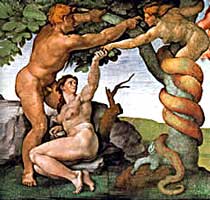 |
1 Now the serpent was more subtle than any other wild creature that the LORD God had made. He said to the woman, "Did God say, 'You shall not eat of any tree of the garden'?" 2 And the woman said to the serpent, "We may eat of the fruit of the trees of the garden; 3 but God said, 'You shall not eat of the fruit of the tree which is in the midst of the garden, neither shall you touch it, lest you die.'" 4 But the serpent said to the woman, "You will not die. 5 For God knows that when you eat of it your eyes will be opened, and you will be like God, knowing good and evil." 6 So when the woman saw that the tree was good for food, and that it was a delight to the eyes, and that the tree was to be desired to make one wise, she took of its fruit and ate; and she also gave some to her husband, and he ate.... 9 But the LORD God called to the man, and said to him, "Where are you?" 10 And he said, "I heard the sound of thee in the garden, and I was afraid, because I was naked; and I hid myself." 11 He said, "Who told you that you were naked? Have you eaten of the tree of which I commanded you not to eat?" 12 The man said, "The
woman whom thou gavest to be with me, she gave me fruit of the tree,
and I ate." 13 Then the LORD God said to the woman, "What
is this that you have done?" The woman said, "The
serpent beguiled me, and I ate." etc. etc. |
 |
28 Then the LORD opened the mouth of the ass, and she said to Balaam, "What have I done to you, that you have struck me these three times?" 29 And Balaam said to the ass, "Because you have made sport of me. I wish I had a sword in my hand, for then I would kill you." 30 And the ass said to Balaam, "Am I not your ass, upon which you have ridden all your life long to this day? Was I ever accustomed to do so to you?" And he said, "No." 31 Then the LORD opened the eyes of Balaam, and he saw the angel of the LORD standing in the way, with his drawn sword in his hand; and he bowed his head, and fell on his face. 32 And the angel of the LORD said to him, "Why have you struck your ass these three times? Behold, I have come forth to withstand you, because your way is perverse before me; 33 and the ass saw me, and turned aside before me these three times. If she had not turned aside from me, surely just now I would have slain you and let her live." 34 Then Balaam said to the angel of the LORD, "I have sinned, for I did not know that thou didst stand in the road against me. Now therefore, if it is evil in thy sight, I will go back again." 35 And the angel of the LORD said to Balaam, "Go with the men; but only the word which I bid you, that shall you speak." So Balaam went on with the princes of Balak. |
|
Why the mess? POCM 2012 |
 |
| Isidorus, that bitter sycophant, realizing that Gaius enjoyed being offered titles beyond human nature, said: "You are going to hate these Jews here, my lord, and their fellow- countrymen more than ever when you hear about their ill-will and impiety towards you. For when all humanity was offering sacrifices of gratitude for your recovery, these were the only ones who could not bear to perform sacrifice. By 'these' I mean to include all the other Jews as well." |
| Seeing the crowds,
he went up on the mountain, and when he sat down his disciples came
to him. And he opened his mouth and taught them, saying:
|
 |
A scholarly and handsome reader Kicks POCM's Ass |
||||
| |||||
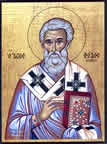 As
you read the quotations in our gospels, did you ever
wonder, The guy who wrote this, how'd he know
that? Mark quoted verbatim the words
the Pharisees thought but didn't speak and that Jesus
mind-read. How did Mark know those never-spoken words
at all, let alone precisely enough to quote exactly,
word for word? Matthew quoted verbatim the words
Herod spoke in his secret meeting. How did Matthew know
those words at all, let alone precisely enough
to quote exactly, word for word?
As
you read the quotations in our gospels, did you ever
wonder, The guy who wrote this, how'd he know
that? Mark quoted verbatim the words
the Pharisees thought but didn't speak and that Jesus
mind-read. How did Mark know those never-spoken words
at all, let alone precisely enough to quote exactly,
word for word? Matthew quoted verbatim the words
Herod spoke in his secret meeting. How did Matthew know
those words at all, let alone precisely enough
to quote exactly, word for word?
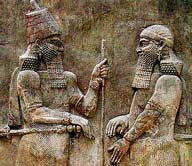 So
how did "Matthew" know these words, spoken
decades earlier, in another country, by people he never
met? How did he know these words at all, let
alone precisely enough to quote them exactly, word for
word? He couldn't. It's not possible.
So
how did "Matthew" know these words, spoken
decades earlier, in another country, by people he never
met? How did he know these words at all, let
alone precisely enough to quote them exactly, word for
word? He couldn't. It's not possible.  "Matthew"
is here committing literary hyperbole.
This is not a sin; it is a choice of style. But it is
a choice that makes what we read here in this gospel
is not history, but religious literature.
"Matthew"
is here committing literary hyperbole.
This is not a sin; it is a choice of style. But it is
a choice that makes what we read here in this gospel
is not history, but religious literature.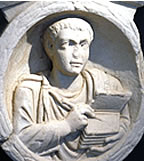 is full of stuff that didn't really happen. Not literally.
Not actually.
is full of stuff that didn't really happen. Not literally.
Not actually.
 Preachers
focus on Jesus' words. Preachers insist the
gospeler "Matthew" was the disciple Matthew,
"John" was John, etc., and the words in the
"disciples' " gospels are the disciples' guy-who-was-there
accounts. A century and a half of reasoned analysis
Preachers
focus on Jesus' words. Preachers insist the
gospeler "Matthew" was the disciple Matthew,
"John" was John, etc., and the words in the
"disciples' " gospels are the disciples' guy-who-was-there
accounts. A century and a half of reasoned analysis
 Scholars
focus on Jesus words. Scholars know the facts
make it impossible "Matthew" was Matthew,
so they imagine Jesus' words coming down through "oral
tradition," and they spend their lives picking
at the "quotes" to get to the the "oral
tradition" to get to the "historical Jesus."
At least, that's how they see it.
Scholars
focus on Jesus words. Scholars know the facts
make it impossible "Matthew" was Matthew,
so they imagine Jesus' words coming down through "oral
tradition," and they spend their lives picking
at the "quotes" to get to the the "oral
tradition" to get to the "historical Jesus."
At least, that's how they see it.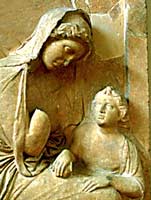 not
the actual words spoken. So when they made up quotes,
not
the actual words spoken. So when they made up quotes, 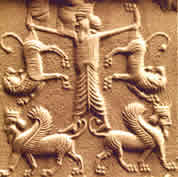
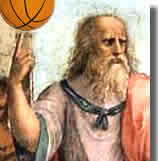

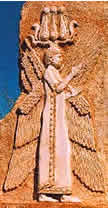 "
" By
the way
By
the way
 Diodorus
of Sicily
Diodorus
of Sicily
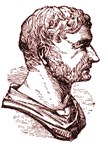

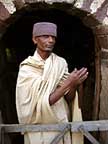 The
Old Testament
The
Old Testament